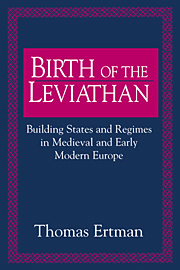Book contents
- Frontmatter
- Contents
- List of Tables
- Acknowledgments
- 1 INTRODUCTION
- 2 THE ORIGINS OF PATRIMONIAL ABSOLUTISM IN LATIN EUROPE
- 3 THE TRIUMPH OF PATRIMONIAL ABSOLUTISM AND THE FAILURE OF REFORM IN LATIN EUROPE, c. 1500–1789
- 4 BUREAUCRATIC CONSTITUTIONALISM IN BRITAIN
- 5 BUREAUCRATIC ABSOLUTISM IN GERMANY
- 6 THE TRIUMPH OF PATRIMONIAL CONSTITUTIONALISM IN HUNGARY AND POLAND AND ITS PREMATURE DEMISE IN SCANDINAVIA
- 7 CONCLUSION
- Bibliography
- Index
1 - INTRODUCTION
Published online by Cambridge University Press: 12 March 2010
- Frontmatter
- Contents
- List of Tables
- Acknowledgments
- 1 INTRODUCTION
- 2 THE ORIGINS OF PATRIMONIAL ABSOLUTISM IN LATIN EUROPE
- 3 THE TRIUMPH OF PATRIMONIAL ABSOLUTISM AND THE FAILURE OF REFORM IN LATIN EUROPE, c. 1500–1789
- 4 BUREAUCRATIC CONSTITUTIONALISM IN BRITAIN
- 5 BUREAUCRATIC ABSOLUTISM IN GERMANY
- 6 THE TRIUMPH OF PATRIMONIAL CONSTITUTIONALISM IN HUNGARY AND POLAND AND ITS PREMATURE DEMISE IN SCANDINAVIA
- 7 CONCLUSION
- Bibliography
- Index
Summary
We live in a great age of statebuilding. With the disintegration of the last colonial empires, the second half of this century has witnessed the birth of dozens of new nations in Asia, Africa, and eastern Europe. The high incidence among these young states of dictatorship, corruption, and separatist threats to central authority has lent added relevance to one of the central questions of political science: how is it possible, under conditions of rapid social and economic change, to construct stable and legitimate governments and honest and effective systems of public administration and finance, all while maintaining an often fragile national unity?
The European statebuilding experience, the only case of sustained political development comparable in scale and scope to the one unleashed by the recent wave of state formation, can cast new light on this question. Between the fall of the Roman Empire and the French Revolution, Europe witnessed the creation of scores of new polities where once a single empire had held sway. Across the length and breadth of the continent, successive generations of leaders were confronted with the arduous task of constructing stable governance structures and state apparatuses capable of unifying often diverse territories in the face of both internal and external threats and of continuous market expansion, urbanization, and social and religious upheaval. Yet despite the similarity of the challenges involved, and the relatively homogeneous cultural setting in which Europe's rulers sought to meet them, the durable state structures which emerged by the end of the early modern period were anything but uniform in character.
- Type
- Chapter
- Information
- Birth of the LeviathanBuilding States and Regimes in Medieval and Early Modern Europe, pp. 1 - 34Publisher: Cambridge University PressPrint publication year: 1997
- 1
- Cited by



